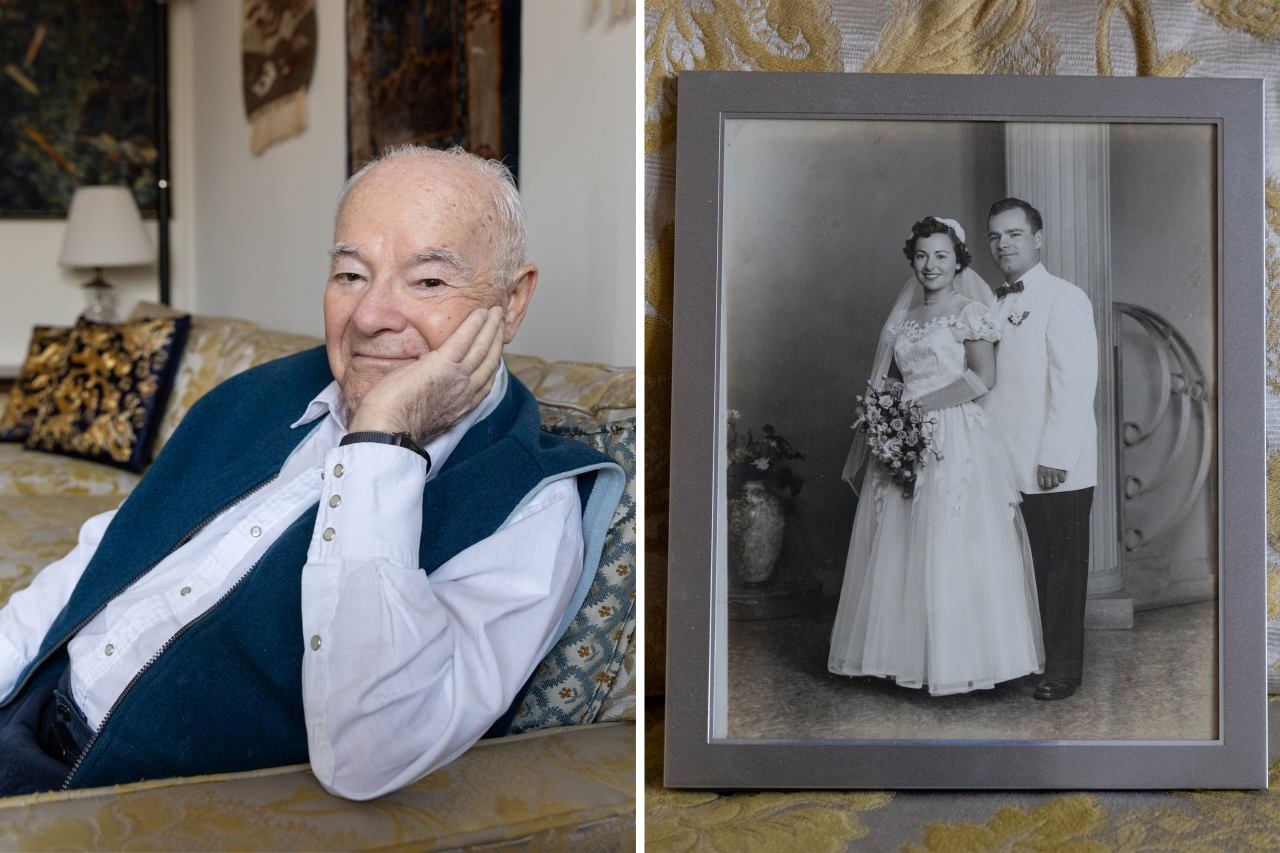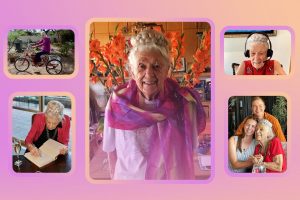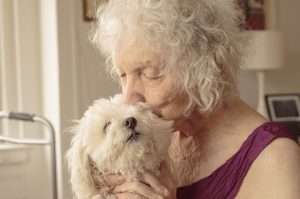Fred and Betty Schlissel met on a Halloween blind date, fell in love and got married. The couple bought a house, raised three children and traveled around the world.
More than 70 years later, their love story continues, though not in the way they expected.
Every morning, Fred, 94 years old, wraps a small piece of cake in a napkin, leaves his apartment and walks over to see his wife. Betty, 93, has dementia and lives in an apartment in the same complex, where she receives memory care. With Betty no longer able to feed herself, Fred brings the cake to her lips. When she is done, he reads her an article or something he has written.
“You like it?” he asks one recent morning. She looks at him and nods.
“That fulfills me,” Schlissel says.
Like millions of couples, the Schlissels aged in tandem chronologically, but not physically and mentally. With Americans living longer with chronic conditions, the differences are becoming more pronounced.
Dr. Louise Aronson , a geriatrician and author, says aging paths often diverge as people grow older, due to biology, behavior and, at times, luck. There are gender-based differences in immune and blood systems, cell structure and brain, as well as different genetic traits and habits. A partner who smoked, loved red meat, didn’t exercise and was a stressed workaholic is likely older biologically than a similarly-aged partner with healthier habits, Aronson says.
Differing needs
With more than 1.5 million units for independent living and assisted living , and occupancy rates of close to 90%, this is where the change in how couples age comes into sharp relief. The Schlissels chose RiverSpring Living, a 32-acre campus in Riverdale, N.Y., that offers independent-living, assisted-living and nursing-care options.
RiverSpring CEO David V. Pomeranz says he sees more couples living apart on the campus, and more have expressed interest. He attributes this to extended longevity and to more people with dementia. Spouses can’t take care of partners but don’t want to be far away.
“They get married, have kids and get old together,” he says. “They never thought they might have different needs.”
When they do, longtime couples who can no longer care for each other are left to grapple with how and whether they can stay together, and what options they can afford.
RiverSpring’s independent-living and assisted-living apartments are largely private-pay. Monthly rent for a one-bedroom unit in independent living ranges from $4,700 to $10,500; a memory-care unit in assisted living ranges from $15,496 to $16,848.
The campus also has 35 assisted-living apartments available for those on Medicaid. There’s a waiting list.
Pomeranz says such arrangements free the healthier spouse from 24/7 care and give them time for themselves.
Emotional benefits
Marcia Miller , 81, lives in an independent-living apartment on the campus. Her husband, Barnett, is in a memory unit. She can’t tend to his needs, but sees him daily and knows he is cared for. Marcia can take classes and go to the museum. “We don’t age at the same rate. We’re individuals,” she says.
There are practical but also emotional benefits of living apart but close, says Aronson, the geriatrician. Regardless of age, many older couples remain dedicated to each other and find comfort in being near.
The healthier partner’s presence shows the staff that someone cares and is watching. A person with dementia might not recognize the partner, but might know their voice or their face and find that familiar and comforting.
The Schlissels married young; Fred was 22, Betty was 20. He spent most of his career as a management consultant and adjunct professor. Betty raised the kids, obtained master’s degrees in education and library science, and worked in libraries. They had an active life, attending the ballet, enjoying the symphony and visiting national parks and ancient ruins.
About 10 years ago, Fred began noticing early signs of dementia in Betty. He, along with his children, realized the couple could no longer manage their five-bedroom home.
They moved into a two-bedroom apartment. Fred, who prides himself on being self-sufficient, cared for Betty as her dementia worsened. After a while, Betty couldn’t feed herself, walk or talk.
“I was deathly afraid of falling with her,” he says. “I’m a little guy, and I’m old.”
Staying engaged
The day Betty moved into a memory-care apartment last summer, Fred rented a one-bedroom apartment in the same complex. It’s an eight-minute walk.
“I had to be with Betty. That was the most important thing,” Fred says. He thinks it also alleviates some worry for his children, who were active in their parents’ lives and concerned about them both.
His daughter visits twice a week. On Sundays, his sons and his daughter-in-law come to see their mom and then go to dinner and a play with their dad. “My dad needs to still enjoy this life,” says his son Alan Schlissel , noting that his dad is sharp and in good physical health for his age.
Fred keeps active, walking 20 minutes on a treadmill and lifting hand weights. He organized a discussion group to explore Jewish teachings. He reads two newspapers and audits a class in psychology offered by the college next door.
He is fortunate, he says, that he and Betty can afford their arrangement. His one-bedroom apartment is comfortable and comforting. Artwork and woven tapestries from the couple’s trips to Nepal, Bhutan and China are on his wall.
Fred sees Betty twice a day, once in the morning and later in the afternoon. He will tell her what is on his mind, read articles from the Financial Times and passages from essays he has written.
One, called “How Old Are You?” recalls the time a panhandler refused Fred’s money, saying the couple was too old. Then in their 70s, they laughed. But it made Fred start thinking about perceptions of aging and variations in chronological age and physical age.
Fred recently reminisced about their Halloween blind date. He was an hour late and dressed as a circus strong man, while Betty dressed as a farm girl, in jeans and a flannel shirt. “Remember that, Betty, how we met?” he asked one morning, looking at her eyes for her subtle response.
He stayed with Betty until she fell asleep.
Write to Clare Ansberry at clare.ansberry@wsj.com










